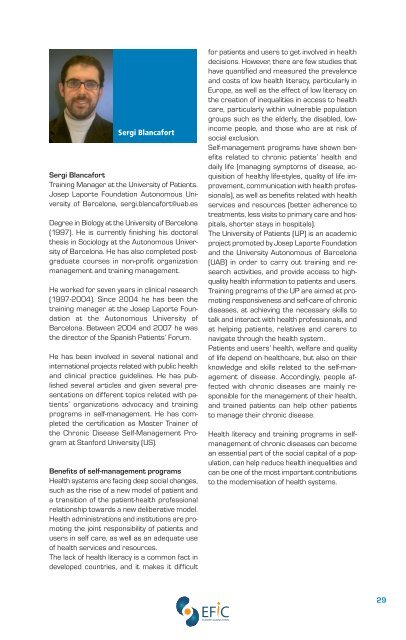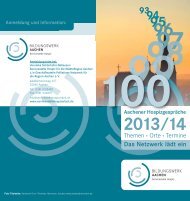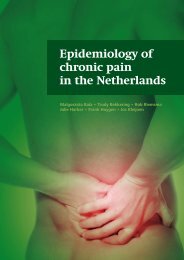First EFIC® Symposium Societal Impact of Pain - SIP
First EFIC® Symposium Societal Impact of Pain - SIP
First EFIC® Symposium Societal Impact of Pain - SIP
Create successful ePaper yourself
Turn your PDF publications into a flip-book with our unique Google optimized e-Paper software.
Sergi Blancafort<br />
Sergi Blancafort<br />
Training Manager at the University <strong>of</strong> Patients.<br />
Josep Laporte Foundation Autonomous University<br />
<strong>of</strong> Barcelona, sergi.blancafort@uab.es<br />
Degree in Biology at the University <strong>of</strong> Barcelona<br />
(1997). He is currently finishing his doctoral<br />
thesis in Sociology at the Autonomous University<br />
<strong>of</strong> Barcelona. He has also completed postgraduate<br />
courses in non-pr<strong>of</strong>it organization<br />
management and training management.<br />
He worked for seven years in clinical research<br />
(1997-2004). Since 2004 he has been the<br />
training manager at the Josep Laporte Foundation<br />
at the Autonomous University <strong>of</strong><br />
Barcelona. Between 2004 and 2007 he was<br />
the director <strong>of</strong> the Spanish Patients’ Forum.<br />
He has been involved in several national and<br />
international projects related with public health<br />
and clinical practice guidelines. He has published<br />
several articles and given several presentations<br />
on different topics related with patients’<br />
organizations advocacy and training<br />
programs in self-management. He has completed<br />
the certification as Master Trainer <strong>of</strong><br />
the Chronic Disease Self-Management Program<br />
at Stanford University (US).<br />
Benefits <strong>of</strong> self-management programs<br />
Health systems are facing deep social changes,<br />
such as the rise <strong>of</strong> a new model <strong>of</strong> patient and<br />
a transition <strong>of</strong> the patient-health pr<strong>of</strong>essional<br />
relationship towards a new deliberative model.<br />
Health administrations and institutions are promoting<br />
the joint responsibility <strong>of</strong> patients and<br />
users in self care, as well as an adequate use<br />
<strong>of</strong> health services and resources.<br />
The lack <strong>of</strong> health literacy is a common fact in<br />
developed countries, and it makes it difficult<br />
for patients and users to get involved in health<br />
decisions. However, there are few studies that<br />
have quantified and measured the prevalence<br />
and costs <strong>of</strong> low health literacy, particularly in<br />
Europe, as well as the effect <strong>of</strong> low literacy on<br />
the creation <strong>of</strong> inequalities in access to health<br />
care, particularly within vulnerable population<br />
groups such as the elderly, the disabled, lowincome<br />
people, and those who are at risk <strong>of</strong><br />
social exclusion.<br />
Self-management programs have shown benefits<br />
related to chronic patients’ health and<br />
daily life (managing symptoms <strong>of</strong> disease, acquisition<br />
<strong>of</strong> healthy life-styles, quality <strong>of</strong> life improvement,<br />
communication with health pr<strong>of</strong>essionals),<br />
as well as benefits related with health<br />
services and resources (better adherence to<br />
treatments, less visits to primary care and hospitals,<br />
shorter stays in hospitals).<br />
The University <strong>of</strong> Patients (UP) is an academic<br />
project promoted by Josep Laporte Foundation<br />
and the University Autonomous <strong>of</strong> Barcelona<br />
(UAB) in order to carry out training and research<br />
activities, and provide access to highquality<br />
health information to patients and users.<br />
Training programs <strong>of</strong> the UP are aimed at promoting<br />
responsiveness and self-care <strong>of</strong> chronic<br />
diseases, at achieving the necessary skills to<br />
talk and interact with health pr<strong>of</strong>essionals, and<br />
at helping patients, relatives and carers to<br />
navigate through the health system.<br />
Patients and users’ health, welfare and quality<br />
<strong>of</strong> life depend on healthcare, but also on their<br />
knowledge and skills related to the self-management<br />
<strong>of</strong> disease. Accordingly, people affected<br />
with chronic diseases are mainly responsible<br />
for the management <strong>of</strong> their health,<br />
and trained patients can help other patients<br />
to manage their chronic disease.<br />
Health literacy and training programs in selfmanagement<br />
<strong>of</strong> chronic diseases can become<br />
an essential part <strong>of</strong> the social capital <strong>of</strong> a population,<br />
can help reduce health inequalities and<br />
can be one <strong>of</strong> the most important contributions<br />
to the modernisation <strong>of</strong> health systems.<br />
29






